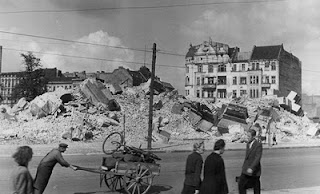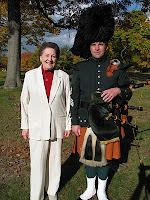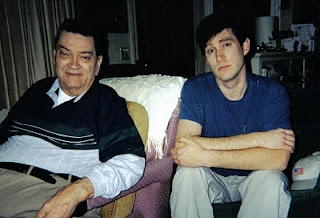The story does not begin with my first trip there in the Fall of 1947, but during World War II, when I was a junior high and high school student in a suburb of St. Louis, Missouri.
My hobby was listening to shortwave broadcasts – the BBC from Britain, Radio Moscow, Australia, Tokyo, Rome and Berlin.
I used to hear the British traitor Lord Haw Haw from Berlin. The British put a rope around his neck after the war. There was the American poet, Ezra Pound in Rome. He was committed.
Then there was Paul Revere in Berlin. This Nazi broadcast began with a fife and drum playing Yankee Doodle. Paul Revere (Douglas Chandler) came on and talked about, “that Jew Rosenvelt in the White House.” He was referring to President Franklin Delano Roosevelt, of course.
Once in awhile, Berlin Radio would come on the air with broadcasts from some of the Nazi leaders, usually Adolf Hitler, Joseph Goebbels or Hermann Goering.
As the war went on, the Allied Air Forces dropped thousands of tons of bombs on the Nazi capital, day and night. Radio Berlin would suddenly go off the air during a raid.
 In January 1945, I tuned into Berlin Radio during an early Saturday morning. They were playing martial music, which usually preceded a speech from one of the Nazi bigwigs. An announcer would come on and excitedly say something in German, which I didn’t understand then, but I did recognize the words “Reichsmarschall Hermann Goering.”
In January 1945, I tuned into Berlin Radio during an early Saturday morning. They were playing martial music, which usually preceded a speech from one of the Nazi bigwigs. An announcer would come on and excitedly say something in German, which I didn’t understand then, but I did recognize the words “Reichsmarschall Hermann Goering.”
During one of these announcements, the announcer stopped abruptly in mid-sentence and did not begin again. Rather, I could here feet running, doors slamming, and then, boom, boom, boom.
It was an air raid. It apparently came upon them so suddenly that broadcast personnel at the Fünfhaus (Broadcast House) in Charlottenburg, quite suddenly evacuated their studios, and the engineers failed to turn off their microphones.
The bombing went on for twenty or thirty minutes. Then there was silence, but I could hear the hum of the transmitter’s carrier wave. Then the music returned, and the announcer introduced Goering, who ranted and raved for two hours.
I called a friend of mine, also a shortwave nut, and he had also heard the bombing of Berlin. Next day, both Sunday newspapers carried a short article on the incident.
I had a column, The War of Wars, in my high school paper the Normandy High School Courier. I wrote about propaganda broadcasts from Berlin, Tokyo and Rome. I wrote a whole column on the bombing of Berlin as heard on their radio.
 In 1946, I was in the U. S. Army, and I was sent to Germany, where I was assigned to the 114th Army Ground Forces Band in Heidelberg.
In 1946, I was in the U. S. Army, and I was sent to Germany, where I was assigned to the 114th Army Ground Forces Band in Heidelberg.
During the Fall of 1947, the band travelled to Berlin, where we furnished music at the Olympic Stadium for the GI Olympics. We spent five days in Berlin. 

The destruction I saw there was almost unbelievable. There was hardly a complete building standing on the Kurfürstendamm (the shopping and theatre district). The Ka De We, a department store, was just a shell for example.
I went into East Berlin and went to Hitler’s bunker, next to the bombed-o ut ruins of his Reich Chancellery. The bunker was flooded, and you could not go down its steps because of the water. There was graffiti – in four languages (English, German, French and Russian) scribbled on the walls at the entrance, which was guarded by a young member of the Red Army.
ut ruins of his Reich Chancellery. The bunker was flooded, and you could not go down its steps because of the water. There was graffiti – in four languages (English, German, French and Russian) scribbled on the walls at the entrance, which was guarded by a young member of the Red Army.
 ut ruins of his Reich Chancellery. The bunker was flooded, and you could not go down its steps because of the water. There was graffiti – in four languages (English, German, French and Russian) scribbled on the walls at the entrance, which was guarded by a young member of the Red Army.
ut ruins of his Reich Chancellery. The bunker was flooded, and you could not go down its steps because of the water. There was graffiti – in four languages (English, German, French and Russian) scribbled on the walls at the entrance, which was guarded by a young member of the Red Army.
I left the Army, got two degrees in music, taught music for four years, and spent a couple of years in television production.
In September 1958, I reenlisted in the Army for the Counter Intelligence Corps, and in October, 1959 I was assigned to the CIC unit in Berlin.
I could not believe what I then saw. The West Berliners had rebuilt their half of the city.








